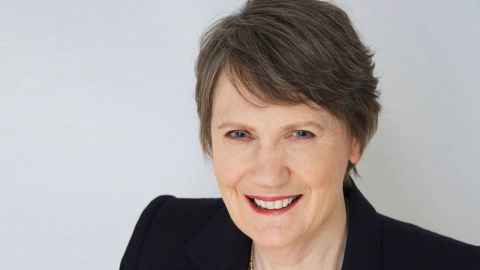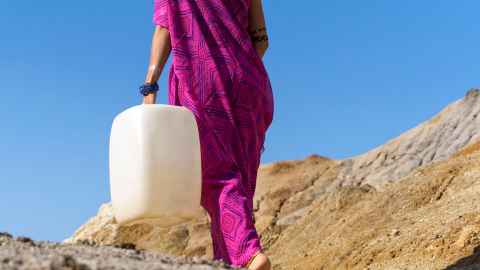Helen Clark – keeping the end goal in sight
19 August 2019
Universities have a crucial part to play in making the world a more inclusive and sustainable place, says the Rt. Honourable Helen Clark.

The 17 Sustainable Development Goals (SDGs) agreed by world leaders at the United Nations in 2015 are a blueprint to achieve a better and more sustainable future for the planet. They address global challenges related to poverty, inquality, education, climate, environmental degradation, peace and justice.
Helen Clark will discuss the current state of play with these goals and what needs to happen to speed up progress in two public conversations hosted by the University of Auckland later this month.
She was the Administrator of the UN Development Programme from 2009 to 2017 during the last six years of the Millennium Development Goals, and the design and early implementation of the Sustainable Development Goals.
“The SDGs are a bold and visionary agenda which inspires us to rethink the way in which we live, work, produce, and consume,” she says.
She believes implementing the 2030 Agenda, of which the 17 goals are part, requires society-wide transformation and thinking and acting outside the silos in which decisions have traditionally been taken.
“It requires being highly conscious of the links between economic, social, and environmental policies.”
She says inspiring current and future generations to think and act for sustainable development, and equipping them with the knowledge to do so, is a vital task for today’s educators, as it is for everyone.
“We live in an age of turmoil and uncertainty. Decision-makers need to be able to address the complex and interlinked challenges which face our world, and citizens need the skills to operate within that world.”
Universities have a significant role to play in preparing current and future generations to navigate a future where “volatility is the new normal”, she says.
“They help build the professional and technical capacities needed to drive the transformation to sustainable development.”
She sees another major strength of universities is their capacity for cross-disciplinary research and teaching, which can tackle the complex interactions between economies, societies, and the environment.
“Applying a planetary health lens, for example, is an exciting way of looking at how human beings and the earth’s ecosystems can both flourish. Research on the links between the two can be a powerful contribution to achieving the SDGs.”
The 2030 Agenda exhorts us to leave no one behind, and right now as a global community we are far from living up to that.
Flowing from their research contribution is the role universities can play in support of evidence-based policy-making.
"While this is clearly not in vogue everywhere, nor across all fields, my impression from working with governments of all kinds around the world over my eight years at the UN is that most want to be able to make decisions which are likely to get the results they desire and are hungry for the information they need to make those decisions," she says.
"Universities are a major source of knowledge, and should be seen as key actors in informing decision-making for sustainable development.”
Central to the 2030 Agenda is accountability: the Agenda must be monitored and reported on to keep countries and governments accountable for the commitments they've made.
“Here too I see universities playing a role, by contributing to the development of national progress reports, indicators, measurement, and evaluation.”
Advocacy is another area where she feels universities, which enjoy high status in their communities and countries, can make a difference.
“They are generally respected for their role in educating future generations, for their research and expertise, and for their overall contribution to society. That makes universities powerful advocates when they choose to use their voice.”
She says the 2015 report of the Rockefeller Foundation-Lancet Commission on Planetary Health found that continuing environmental degradation threatens to reverse the health gains achieved over the past century.

“If collectively we continue to career towards exceeding more planetary boundaries, then on a worst-case scenario, which is not improbable without dramatic change in how we actually ‘develop’, improvements in human development overall will slow to a crawl, and there may well be regression in some regions.”
A ringing phrase in the Rockefeller report states: “We have been mortgaging the health of future generations to realise economic and development gains in the present.”
Since 2015, which was the year of notable agendas like the SDGs and the Paris Climate Agreement, she says there’s been disappointing progress on implementation.
“On current trends, for example, we would reach 2030 with hundreds of millions of people still deeply impoverished and hungry, when the SDGs targets called for the eradication of both. The 2030 Agenda exhorts us to leave no one behind, and right now as a global community we are far from living up to that.”
Among the many implications for the planet in the World Meteorological Organisation’s (WMO) State of the Global Climate in 2018 report, one of the most dire is food production.
“We see more regular, very serious drought conditions in, for example, the Sahel and the Horn of Africa. I was recently in Afghanistan where provinces in the north and west have been suffering their worst drought in decades. That displaced more than a quarter of a million people into tent cities around towns in Herat and Badghis provinces alone. This very serious situation seems to have gone largely under the international radar.”
The World Bank last year forecast that climate-led migration could affect 2.8 percent of the population of Sub-Saharan Africa, South Asia, and Latin America – some 143 million people, and that doesn’t include the exposed populations of East and South East Asia.
She says solutions to many of these challenges already exist, but won’t be implemented without political will and widespread public awareness and support.
“Leaders at every level must make the case for, and develop capacities for, action, including on funding. For the poorest countries, there must be international solidarity; many are badly exposed to major adverse climate events which they have played no part in causing.
“If we want to ensure the future health and wellbeing of people and our planet, then we must address wide-ranging determinants; from poverty, marginalisation and discrimination, to the aggressive marketing and trade of unhealthy substances. We have to look at the consequences of sedentary lifestyles, climate change, biodiversity loss, and pollution of air, land, and water."
Helen Clark will be in conversation on 28 August 2019 at the Fale Pasifika, University of Auckland as a guest of the Public Policy Institute (Faculty of Arts). This event is sold out but a recording will be available on the Public Policy website.
On 29 August, she will be speaking at Forum North, Whangārei as part of the University's Tai Tokerau Campus Global Issues Speaker Series. While sold out, this event will be available afterwards on the Tai Tokerau Campus website.
Media contact
Julianne Evans | Media adviser
Mob: 027 562 5868
Email: julianne.evans@auckland.ac.nz